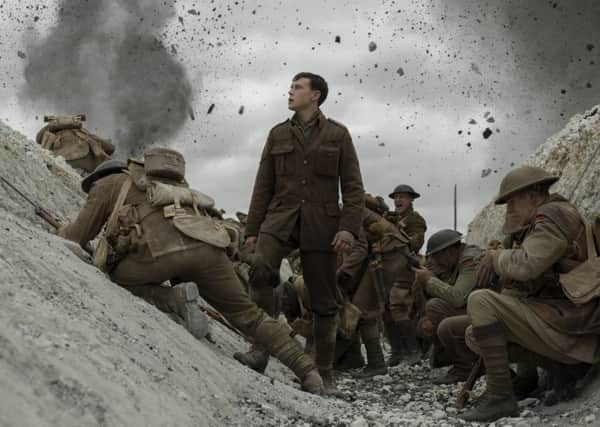Film reviews: 1917 | Uncut Gems | Seberg


1917 (15) ****
Uncut Gems (15) *****
Seberg (15) **
Winner of best drama and best director at the Golden Globes last weekend, Sam Mendes’ new film 1917 builds on a story his soldier grandfather told him about fighting on the Western Front and expands it into a race-against-time action film about the fragility of human life. Set in Northern France over the course of a few frantic hours, the film follows a pair of soldiers tasked with delivering an urgent message to a British battalion about to walk into a German trap, with Mendes reinforcing the urgency of the theme by shooting the movie in two simulated single takes divided by a midpoint blackout that allows the film to transition from daylight to pre-dawn the following day.
It’s a technique that was used brilliantly in Birdman a few years ago, though Mendes – who road-tested the single-take action sequence with the opening scene of Spectre – arguably set himself, co-writer Krysty Wilson-Cairns and genius cinematographer Roger Deakins a bigger challenge by having this story take place almost entirely outdoors, with protagonists negotiating the ravaged landscape of war-torn France. Appropriately enough, the film wastes no time plunging us into the horrors of war – not with a big battle scene, but with its eerie aftermath as Lance Corporals Blake (Dean-Charles Chapman) and Schofield (George MacKay) are ordered to travel across no-man’s land and behind enemy lines to deliver crucial intel to British forces who think they’ve got the enemy on the run.
Advertisement
Hide AdIn lieu of a visible enemy, Mendes ratchets up the tension here by having Blake and the Somme-scarred Schofield learn quickly that barbed wire and rats might prove just as fatal as gunfire if they’re not careful. Yet, having explored the detrimental psychological effect of inaction on battle-ready professionals in his Gulf War drama Jarhead, he also examines the flip side of this by having these young men – who barely look older than boys – encounter various battle-hardened and higher-ranking soldiers who’ve been ground down or dehumanised by this war of attrition. Andrew Scott is the stand-out among the many big name actors recruited for cameos (Colin Firth, Benedict Cumberbatch and Richard Madden also appear) and far from these being distracting, they help shoulder the weight of a story that sits a little uneasily at first on its young leads. Chapman, especially, struggles to match his acting style to the harrowing realism the film demands, though MacKay does have the haunted look of those young soldiers staring out of the screen in Peter Jackson’s They Shall Not Grow Old documentary and, as the film progresses, he seems to grow into the role the more urgent his character’s mission becomes. Though the second half’s somewhat theatrical transition into more mythic territory isn’t quite as gripping, as the film pushes on towards its Gallipoli-like climax, the tension returns and Mendes pitches the ending just right, capturing the shellshocked emotional toll of war on those all too familiar with its devastating impact.
Outstripping 1917 for sheer nerve-jangling tension is Uncut Gems. This latest arthouse thriller from New York auteurs Josh and Bennie Safdie (Good Time) stars Adam Sandler as a diamond dealer on a chaotic downward spiral as he tries to pull off the deal of his life (it involves selling an uncut black opal he’s imported from an unregulated Ethiopian mine). A compulsive gambler who seemingly spends every waking second making deals to offset his debts, the film zeroes in on a few days of his life as he negotiates the imminent implosion of his marriage, the stress of his relationship with his much younger mistress, the debt collectors who are starting to demand payment in ever more violent ways, and his own inability to stop himself making crazy bets on the basketball play-offs he’s obsessed with. The Safdies have a real skill at capturing the sights and sounds of New York with overlapping dialogue, documentary style camera work and naturalistic performances from a cast of stars and non-professionals alike, but they jack things up in intriguing ways – with Daniel Lopatin’s swirling synth score adding a surreal edge and an early 2010s period setting allowing them to build the film round a real series of basketball games (they even recruit the NBA player at the centre of them, Kevin Garnett, to play himself in a major role). The end result is frantic but carefully constructed filmmaking, full of little details that have big pay-offs later on. And Sandler really is astonishing. Described in the film by his wife (played by Idina Menzel) as the most annoying person she’s ever met, his character is maddening yet oddly sympathetic. Even as he’s behaving badly, it’s hard not to root for him.
Given that Jean Seberg’s life and tragic demise was bound up with a despicable campaign by the FBI to “neutralise” her for her affiliations with the Black Panthers, one might think that a movie about the systematic destruction of the woman who became the poster girl for the French New Wave would make for an intriguing exploration of the crossover between the entertainment industry and the political unrest of the late 1960s and early 1970s. Sadly, despite a fine performance from Kristen Stewart in the lead, Seberg misses the mark by turning her story into a two-hander focusing both on her radical chic affiliations and the fictionalised FBI agent (Jack O’Connell) whose conscience is awakened by the detrimental effect his surveillance work has on her. ■